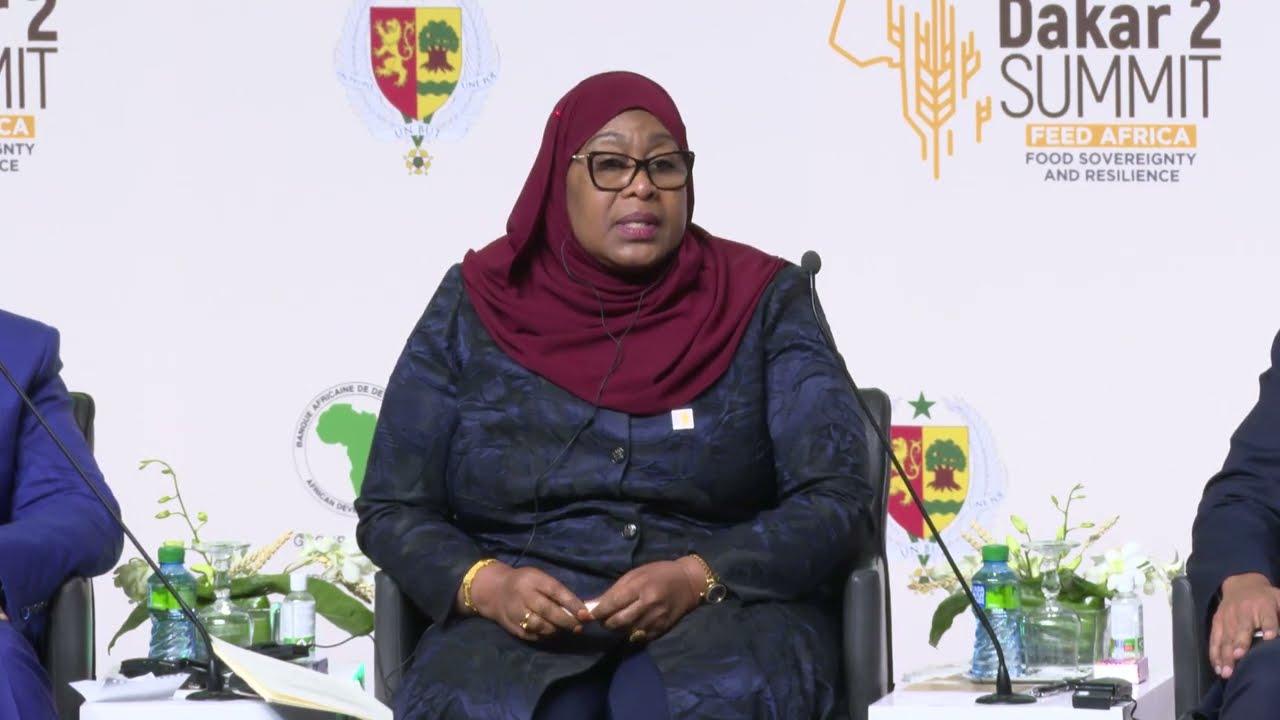Africa-Press – Tanzania. A HUNGRY man is an angry man, so it’s really in the best interest of any country right from the family level to have food for its members. If this is not addressed, no one needs to be a Rocket Scientist to be told that constant hunger would weaken the body and what follows are health conditions including diabetes, hyperthyroidism, depression, you name it weighing one down.
With this background President Samia Suluhu Hassan deserves praise for allocating some 150bn/- (64.2 million USD) to enable farmers have access to fertilisers at affordable prices in the race to revolutionise the agricultural industry in Tanzania.
This will come handy in addressing the inputs supply to local farmers, who have been disrupted by unstable supply and prices worsened by world crisis including the Covid-19 pandemic and Ukraine and Russia War.
Speaking recently as a panelist at the Second Africa Food Summit in Dakar, Senegal she noted that the sixth phase government is well aware that the future of agriculture will not be realistic without the young people active participation, since the group commands 44.5 per cent of the country’s 61.7 million people as per the 2022 Population and Housing Census.
In her quick analysis, she said survey into the challenges backpeddling youth fully joining the sector included their lack to pieces of land, finances, technology and mechanisation.
To address that she committed that her government will provide them with land and own where each will have about 10 hectares and this is necessary, because with no land to a farmer, definitely no farming activity will take place. To quote her, she said: “The youth will be trained for 3 months before they are given land and so far, we have identified a total of 680,000 acres of land that will be offered to the youths and women for cultivation.”
Going for another collaborative approach, she opted for establishing a Trust Fund named Agricultural Input Trust Fund aimed at supporting the youth to manage agricultural input supplies namely fertilisers, seeds and pesticides among others.
“The issue of marketing is also well considered in this agenda and for the youths to improve production, we are inviting the private sector to support the government initiative especially in the areas of mechanisation and modernisation of agriculture sector,” she said.
Her list was not complete without mentioning Training (read providing skills) for them- this is necessary so that they have the right and modern techniques on say farming methods, pests’ management, soil knowledge and requirements among others, which collectively will guarantee them high yields.
In her speech, the Head of State also included bringing Incubation Centers onboard this is because such institutions support entrepreneurs in developing their businesses, especially in initial stages. In a nutshell, they speed up the growth and success of start-ups and enable the participants to capture fellow entrepreneurs’ uniqueness, besides offering support and customised services to maximise businesses potential.
According to her, if these are followed to the letter including building their capacity, providing the right environment and creating a conducive environment for them, by next year the country can feed the continent.
Currently Tanzania has food efficiency of over 120 per cent is as a result of improved use of technology that in turn has increased productivity in line with a priority of becoming a food hub for Africa.
Equally, this can be achieved if the country ensures that the fore-mentioned inputs including technologies are made available, accessible and affordable to the majority of the farmers currently known as Smallholder and possibly the name to be transformed and make them become profitable small rural enterprisers.
In a related development, President Samia made assurance of achieving a 10 per cent annual growth rate in the agricultural sector by 2030 compared to the current growth of around 3.6 per cent, as part of the Tanzania’s ambitious agricultural transformation vision.
She also said that the government has initiated a programme called ‘Build a Better Tomorrow’ (BBT) for youths and women, to make them attracted with the sector, where it gives them land to own it and produce. She said under the programme, each youth is given at least 10 acres of land.
The president said the initiative has been well received by the youths, saying so far, at least 7,000 of them have been registered in the BBT programme, while 1,500 others have applied for grants and loans from different financial sectors for them to fully engage in agriculture.
She said the government has also been pushing for the financial sectors to reduce interest rates for youths to be attracted to secure loans and the rates have dropped significantly from 15 per cent to 9 per cent.
The Dakar summit is aimed at mapping out plans to unlock Africa’s food-producing potential and position the continent to become a breadbasket to the world.
Organisers of the summit said the event is particularly practical given the fact that Africa has more than 60 per cent of the world’s remaining arable land, despite being home to a third of the 850 million people living with hunger across the globe.
Speaking ahead of the meeting, the President of the African Development Bank Group (AfDB) Dr Akinwumi Adesina said the summit will mobilise political commitment as well as development partner and private sector investment.
“The continent has more than 60 per cent of the world’s remaining arable land, and millions of Africans are productive in the agriculture sector. With the removal of barriers to agricultural development aided by new investments, it is estimated that Africa’s agricultural output could increase from 280 billion US dollars a year to 1 trillion US dollars by the year 2030.
“The summit will establish much needed policies and strategically drive actions to deliver at scale. This landmark event will be a turning point towards food sovereignty and resilience for the entire continent,” he said.
The summit is at the heart of the Bank Group’s Feed Africa Strategy, one of the institution’s five priority areas to support African countries to significantly increase agricultural growth.
The summit is a follow-up to the 2015 inaugural edition, during which the Feed Africa Strategy for Agricultural Transformation (2016-2025) in Africa, was proposed.
During the summit, heads of state and government will convene sessions to develop transformational country-specific food and agriculture delivery compacts.
Development partners and the private sector will also play significant roles during sessions and the overall summit. African countries are also expected to make measurable political commitments to implement policies designed to eliminate extreme poverty, hunger and malnutrition in Africa.
Coupled with this the sixth phase government has laid out its agenda and priorities for agricultural transformation in multi-year, multi-sectoral strategies, including the third National Five-Year Development Plan (FYDP III), Pathways for Sustainable Food Systems 2030, and the Agenda 10/30.
Notably, the Food and Agriculture Delivery Compact pritotizes four value chains and four key investment areas ranging from:
To achieve these targets, the Compact will scale up investments in the following four priority areas:
Equally, talk of political Political commitment to oil these: In the 2022/23 Government Budget, the government substantially increased budget to $ 412.2 million in 2022/23 from $ 126.7 million. This reflects the growing political will and the government commitment to transform the sector.
To facilitate investment by the private sector, the Government is investing in identifying and acquiring land available for large scale block farming and installing irrigation infrastructure and dams to some acquired land through the Building a Better Tomorrow (BBT) initiative, among other projects.
In the same vein, the Government is supporting mechanisation through tax incentives (VAT and import duty waiver) to increase the utilization of machines and inputs for efficient production such as Tractors, fertiliser and irrigation equipment as per VAT ACT 2014.
This has seen the country making great progress in reforming its trunk roads, improving the quality of the road network in both urban and rural areas. The country has also seen significant gains in ICT networks and recently allocated significant resources to support electricity generation, industrial parks, and construction of the standard gauge railway (SGR).
Similarly, the country has invested heavily on agricultural infrastructure (warehouses, irrigation infrastructure, marketing infrastructure and others).
Partner’s commitment – Key development partners with active projects in the agricultural sector are: the World Bank, International Fund for Agricultural Development (IFAD), The African Development Bank (AFDB), European Union (EU), Japan International Cooperation Agency, USAID, Agence Française de Dévelopement (AFD) among others. With them, the Government of United Republic of Tanzania is soliciting public and private partners support to fund the value chains prioritized investments from the Compact.
Coordination mechanism: The Government will establish a Presidential High-Level Council for Food and Agriculture Delivery Compacts that will also include PPP Platforms and Technical committees to drive action and deliver results at scale to meet the set targets.
Source: Daily News – Tanzania Standard Newspapers
For More News And Analysis About Tanzania Follow Africa-Press







